Case Study: International Business Strategy of Rovio Entertainment
VerifiedAdded on 2023/01/18
|8
|2445
|97
Case Study
AI Summary
This case study analyzes Rovio Entertainment's international business strategy, focusing on the impact of global megatrends and ecological systems on its business model. The study examines how Rovio, known for its Angry Birds game, adapts to technological advancements, globalization, and demographic shifts to thrive in the competitive market. The case study explores the threats and opportunities faced by Rovio, including its diversification strategies and market entry into the US and China. It also delves into the implications of operating in Finland and Japan, analyzing the company's strategic approach and the influence of cultural and technological factors. The analysis covers the application of the ecological systems theory to understand Rovio's micro, meso, exo, macro, and chrono systems. The document highlights how Rovio has leveraged technology, globalization, and demographic trends, while also addressing the challenges of innovation and market diversification. The conclusion suggests that Rovio could benefit from shifting its base to Japan for enhanced technological and strategic support. The assignment provides a comprehensive overview of Rovio's strategic decisions and their impact on its international business endeavors.
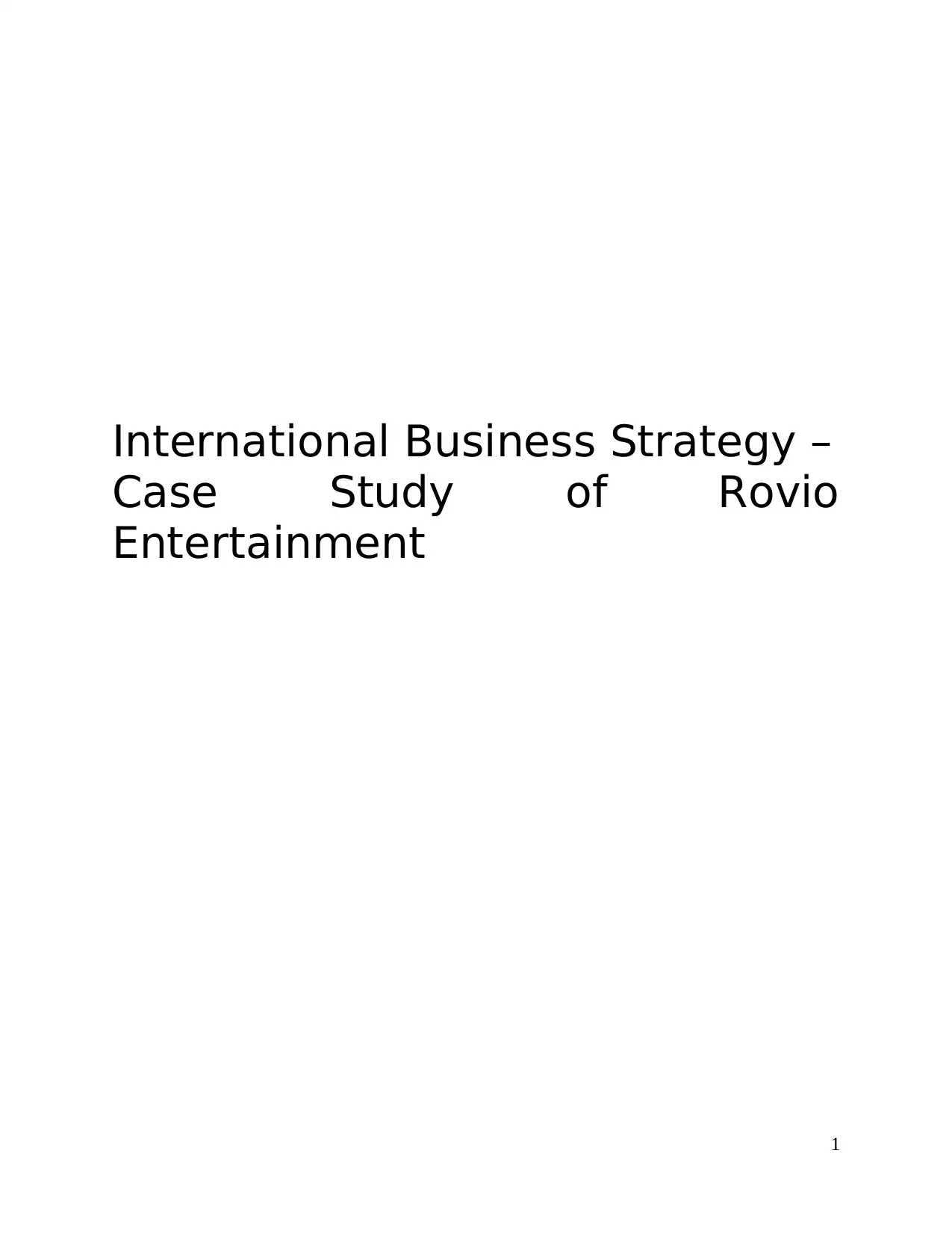
International Business Strategy –
Case Study of Rovio
Entertainment
1
Case Study of Rovio
Entertainment
1
Paraphrase This Document
Need a fresh take? Get an instant paraphrase of this document with our AI Paraphraser
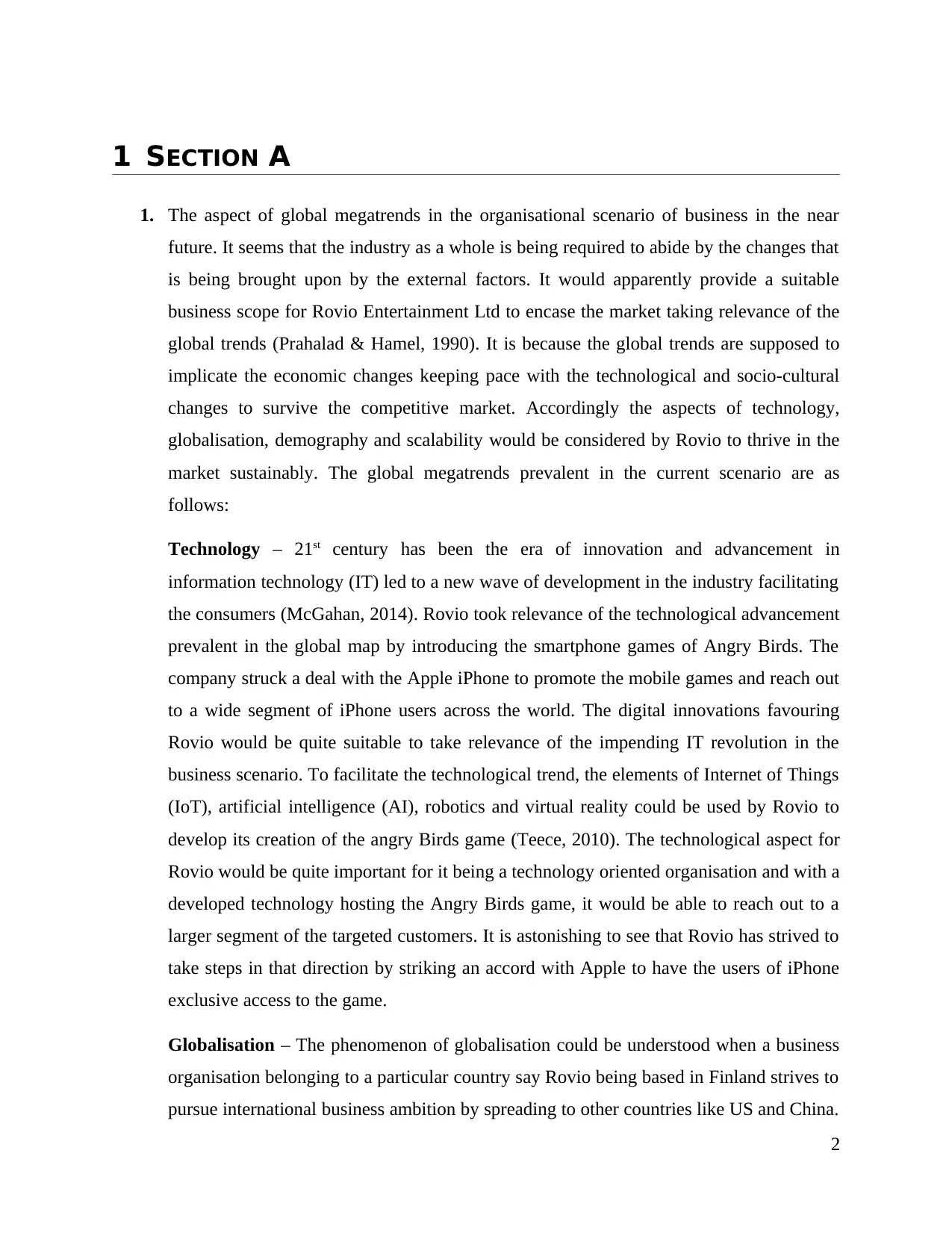
1 SECTION A
1. The aspect of global megatrends in the organisational scenario of business in the near
future. It seems that the industry as a whole is being required to abide by the changes that
is being brought upon by the external factors. It would apparently provide a suitable
business scope for Rovio Entertainment Ltd to encase the market taking relevance of the
global trends (Prahalad & Hamel, 1990). It is because the global trends are supposed to
implicate the economic changes keeping pace with the technological and socio-cultural
changes to survive the competitive market. Accordingly the aspects of technology,
globalisation, demography and scalability would be considered by Rovio to thrive in the
market sustainably. The global megatrends prevalent in the current scenario are as
follows:
Technology – 21st century has been the era of innovation and advancement in
information technology (IT) led to a new wave of development in the industry facilitating
the consumers (McGahan, 2014). Rovio took relevance of the technological advancement
prevalent in the global map by introducing the smartphone games of Angry Birds. The
company struck a deal with the Apple iPhone to promote the mobile games and reach out
to a wide segment of iPhone users across the world. The digital innovations favouring
Rovio would be quite suitable to take relevance of the impending IT revolution in the
business scenario. To facilitate the technological trend, the elements of Internet of Things
(IoT), artificial intelligence (AI), robotics and virtual reality could be used by Rovio to
develop its creation of the angry Birds game (Teece, 2010). The technological aspect for
Rovio would be quite important for it being a technology oriented organisation and with a
developed technology hosting the Angry Birds game, it would be able to reach out to a
larger segment of the targeted customers. It is astonishing to see that Rovio has strived to
take steps in that direction by striking an accord with Apple to have the users of iPhone
exclusive access to the game.
Globalisation – The phenomenon of globalisation could be understood when a business
organisation belonging to a particular country say Rovio being based in Finland strives to
pursue international business ambition by spreading to other countries like US and China.
2
1. The aspect of global megatrends in the organisational scenario of business in the near
future. It seems that the industry as a whole is being required to abide by the changes that
is being brought upon by the external factors. It would apparently provide a suitable
business scope for Rovio Entertainment Ltd to encase the market taking relevance of the
global trends (Prahalad & Hamel, 1990). It is because the global trends are supposed to
implicate the economic changes keeping pace with the technological and socio-cultural
changes to survive the competitive market. Accordingly the aspects of technology,
globalisation, demography and scalability would be considered by Rovio to thrive in the
market sustainably. The global megatrends prevalent in the current scenario are as
follows:
Technology – 21st century has been the era of innovation and advancement in
information technology (IT) led to a new wave of development in the industry facilitating
the consumers (McGahan, 2014). Rovio took relevance of the technological advancement
prevalent in the global map by introducing the smartphone games of Angry Birds. The
company struck a deal with the Apple iPhone to promote the mobile games and reach out
to a wide segment of iPhone users across the world. The digital innovations favouring
Rovio would be quite suitable to take relevance of the impending IT revolution in the
business scenario. To facilitate the technological trend, the elements of Internet of Things
(IoT), artificial intelligence (AI), robotics and virtual reality could be used by Rovio to
develop its creation of the angry Birds game (Teece, 2010). The technological aspect for
Rovio would be quite important for it being a technology oriented organisation and with a
developed technology hosting the Angry Birds game, it would be able to reach out to a
larger segment of the targeted customers. It is astonishing to see that Rovio has strived to
take steps in that direction by striking an accord with Apple to have the users of iPhone
exclusive access to the game.
Globalisation – The phenomenon of globalisation could be understood when a business
organisation belonging to a particular country say Rovio being based in Finland strives to
pursue international business ambition by spreading to other countries like US and China.
2
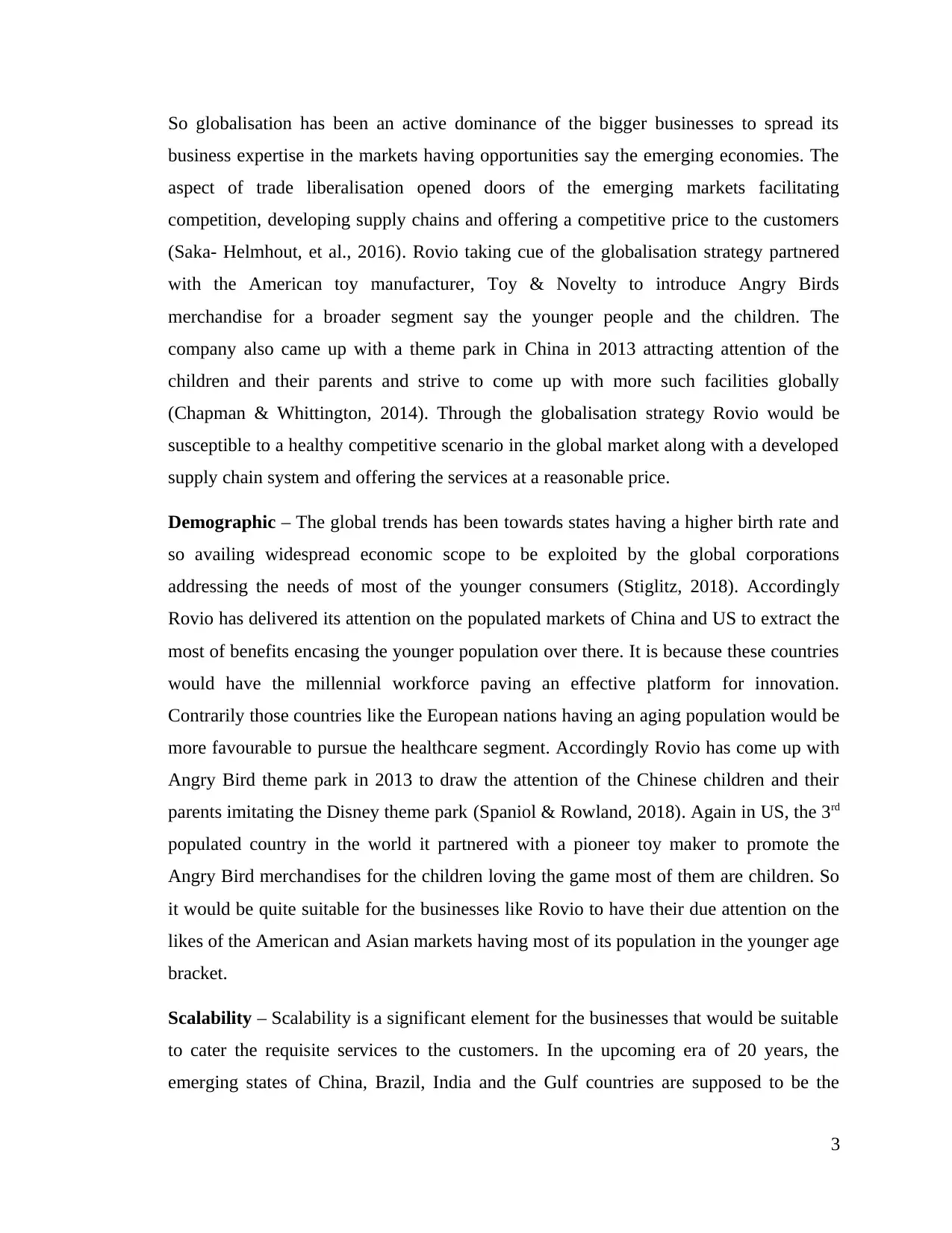
So globalisation has been an active dominance of the bigger businesses to spread its
business expertise in the markets having opportunities say the emerging economies. The
aspect of trade liberalisation opened doors of the emerging markets facilitating
competition, developing supply chains and offering a competitive price to the customers
(Saka- Helmhout, et al., 2016). Rovio taking cue of the globalisation strategy partnered
with the American toy manufacturer, Toy & Novelty to introduce Angry Birds
merchandise for a broader segment say the younger people and the children. The
company also came up with a theme park in China in 2013 attracting attention of the
children and their parents and strive to come up with more such facilities globally
(Chapman & Whittington, 2014). Through the globalisation strategy Rovio would be
susceptible to a healthy competitive scenario in the global market along with a developed
supply chain system and offering the services at a reasonable price.
Demographic – The global trends has been towards states having a higher birth rate and
so availing widespread economic scope to be exploited by the global corporations
addressing the needs of most of the younger consumers (Stiglitz, 2018). Accordingly
Rovio has delivered its attention on the populated markets of China and US to extract the
most of benefits encasing the younger population over there. It is because these countries
would have the millennial workforce paving an effective platform for innovation.
Contrarily those countries like the European nations having an aging population would be
more favourable to pursue the healthcare segment. Accordingly Rovio has come up with
Angry Bird theme park in 2013 to draw the attention of the Chinese children and their
parents imitating the Disney theme park (Spaniol & Rowland, 2018). Again in US, the 3rd
populated country in the world it partnered with a pioneer toy maker to promote the
Angry Bird merchandises for the children loving the game most of them are children. So
it would be quite suitable for the businesses like Rovio to have their due attention on the
likes of the American and Asian markets having most of its population in the younger age
bracket.
Scalability – Scalability is a significant element for the businesses that would be suitable
to cater the requisite services to the customers. In the upcoming era of 20 years, the
emerging states of China, Brazil, India and the Gulf countries are supposed to be the
3
business expertise in the markets having opportunities say the emerging economies. The
aspect of trade liberalisation opened doors of the emerging markets facilitating
competition, developing supply chains and offering a competitive price to the customers
(Saka- Helmhout, et al., 2016). Rovio taking cue of the globalisation strategy partnered
with the American toy manufacturer, Toy & Novelty to introduce Angry Birds
merchandise for a broader segment say the younger people and the children. The
company also came up with a theme park in China in 2013 attracting attention of the
children and their parents and strive to come up with more such facilities globally
(Chapman & Whittington, 2014). Through the globalisation strategy Rovio would be
susceptible to a healthy competitive scenario in the global market along with a developed
supply chain system and offering the services at a reasonable price.
Demographic – The global trends has been towards states having a higher birth rate and
so availing widespread economic scope to be exploited by the global corporations
addressing the needs of most of the younger consumers (Stiglitz, 2018). Accordingly
Rovio has delivered its attention on the populated markets of China and US to extract the
most of benefits encasing the younger population over there. It is because these countries
would have the millennial workforce paving an effective platform for innovation.
Contrarily those countries like the European nations having an aging population would be
more favourable to pursue the healthcare segment. Accordingly Rovio has come up with
Angry Bird theme park in 2013 to draw the attention of the Chinese children and their
parents imitating the Disney theme park (Spaniol & Rowland, 2018). Again in US, the 3rd
populated country in the world it partnered with a pioneer toy maker to promote the
Angry Bird merchandises for the children loving the game most of them are children. So
it would be quite suitable for the businesses like Rovio to have their due attention on the
likes of the American and Asian markets having most of its population in the younger age
bracket.
Scalability – Scalability is a significant element for the businesses that would be suitable
to cater the requisite services to the customers. In the upcoming era of 20 years, the
emerging states of China, Brazil, India and the Gulf countries are supposed to be the
3
⊘ This is a preview!⊘
Do you want full access?
Subscribe today to unlock all pages.

Trusted by 1+ million students worldwide
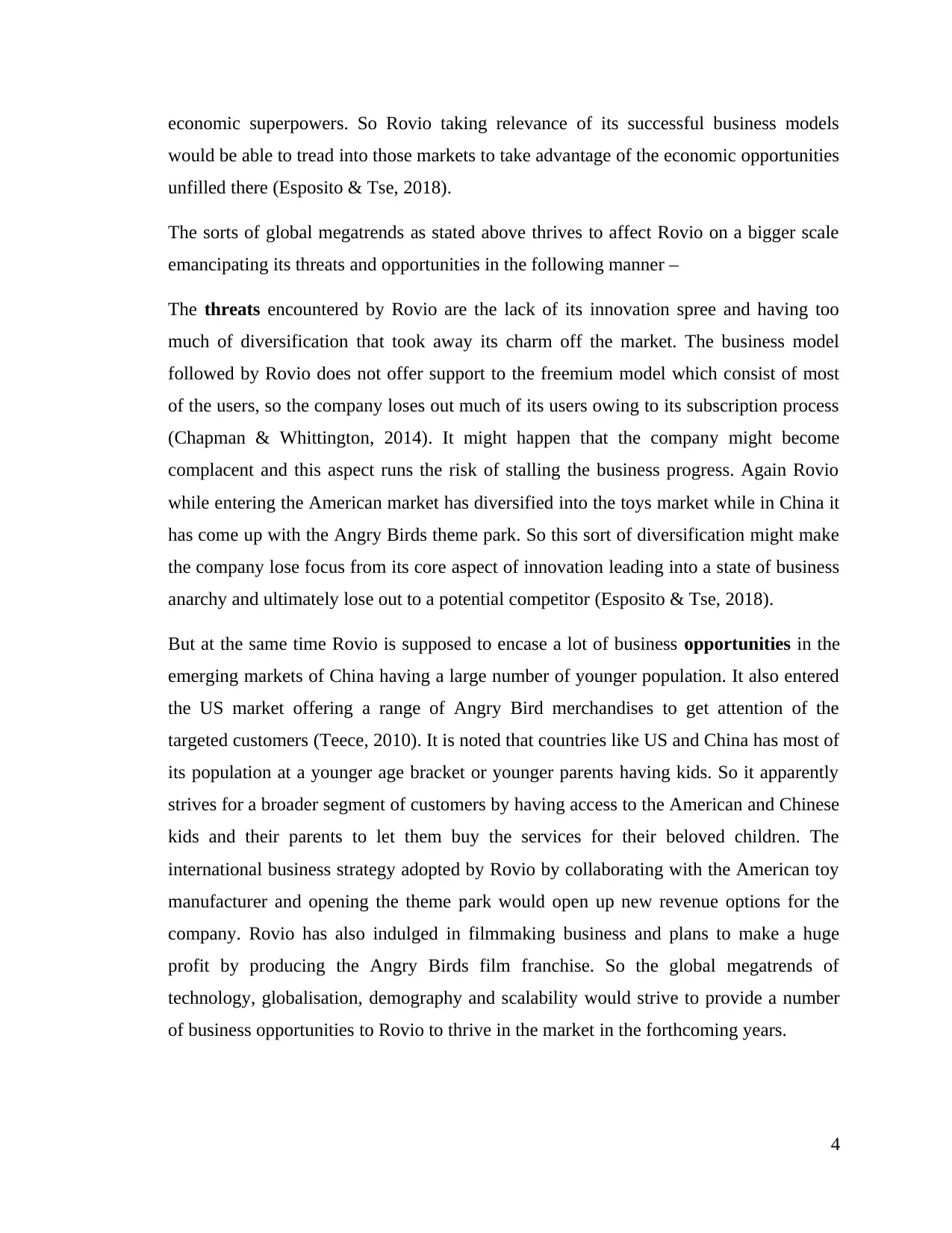
economic superpowers. So Rovio taking relevance of its successful business models
would be able to tread into those markets to take advantage of the economic opportunities
unfilled there (Esposito & Tse, 2018).
The sorts of global megatrends as stated above thrives to affect Rovio on a bigger scale
emancipating its threats and opportunities in the following manner –
The threats encountered by Rovio are the lack of its innovation spree and having too
much of diversification that took away its charm off the market. The business model
followed by Rovio does not offer support to the freemium model which consist of most
of the users, so the company loses out much of its users owing to its subscription process
(Chapman & Whittington, 2014). It might happen that the company might become
complacent and this aspect runs the risk of stalling the business progress. Again Rovio
while entering the American market has diversified into the toys market while in China it
has come up with the Angry Birds theme park. So this sort of diversification might make
the company lose focus from its core aspect of innovation leading into a state of business
anarchy and ultimately lose out to a potential competitor (Esposito & Tse, 2018).
But at the same time Rovio is supposed to encase a lot of business opportunities in the
emerging markets of China having a large number of younger population. It also entered
the US market offering a range of Angry Bird merchandises to get attention of the
targeted customers (Teece, 2010). It is noted that countries like US and China has most of
its population at a younger age bracket or younger parents having kids. So it apparently
strives for a broader segment of customers by having access to the American and Chinese
kids and their parents to let them buy the services for their beloved children. The
international business strategy adopted by Rovio by collaborating with the American toy
manufacturer and opening the theme park would open up new revenue options for the
company. Rovio has also indulged in filmmaking business and plans to make a huge
profit by producing the Angry Birds film franchise. So the global megatrends of
technology, globalisation, demography and scalability would strive to provide a number
of business opportunities to Rovio to thrive in the market in the forthcoming years.
4
would be able to tread into those markets to take advantage of the economic opportunities
unfilled there (Esposito & Tse, 2018).
The sorts of global megatrends as stated above thrives to affect Rovio on a bigger scale
emancipating its threats and opportunities in the following manner –
The threats encountered by Rovio are the lack of its innovation spree and having too
much of diversification that took away its charm off the market. The business model
followed by Rovio does not offer support to the freemium model which consist of most
of the users, so the company loses out much of its users owing to its subscription process
(Chapman & Whittington, 2014). It might happen that the company might become
complacent and this aspect runs the risk of stalling the business progress. Again Rovio
while entering the American market has diversified into the toys market while in China it
has come up with the Angry Birds theme park. So this sort of diversification might make
the company lose focus from its core aspect of innovation leading into a state of business
anarchy and ultimately lose out to a potential competitor (Esposito & Tse, 2018).
But at the same time Rovio is supposed to encase a lot of business opportunities in the
emerging markets of China having a large number of younger population. It also entered
the US market offering a range of Angry Bird merchandises to get attention of the
targeted customers (Teece, 2010). It is noted that countries like US and China has most of
its population at a younger age bracket or younger parents having kids. So it apparently
strives for a broader segment of customers by having access to the American and Chinese
kids and their parents to let them buy the services for their beloved children. The
international business strategy adopted by Rovio by collaborating with the American toy
manufacturer and opening the theme park would open up new revenue options for the
company. Rovio has also indulged in filmmaking business and plans to make a huge
profit by producing the Angry Birds film franchise. So the global megatrends of
technology, globalisation, demography and scalability would strive to provide a number
of business opportunities to Rovio to thrive in the market in the forthcoming years.
4
Paraphrase This Document
Need a fresh take? Get an instant paraphrase of this document with our AI Paraphraser
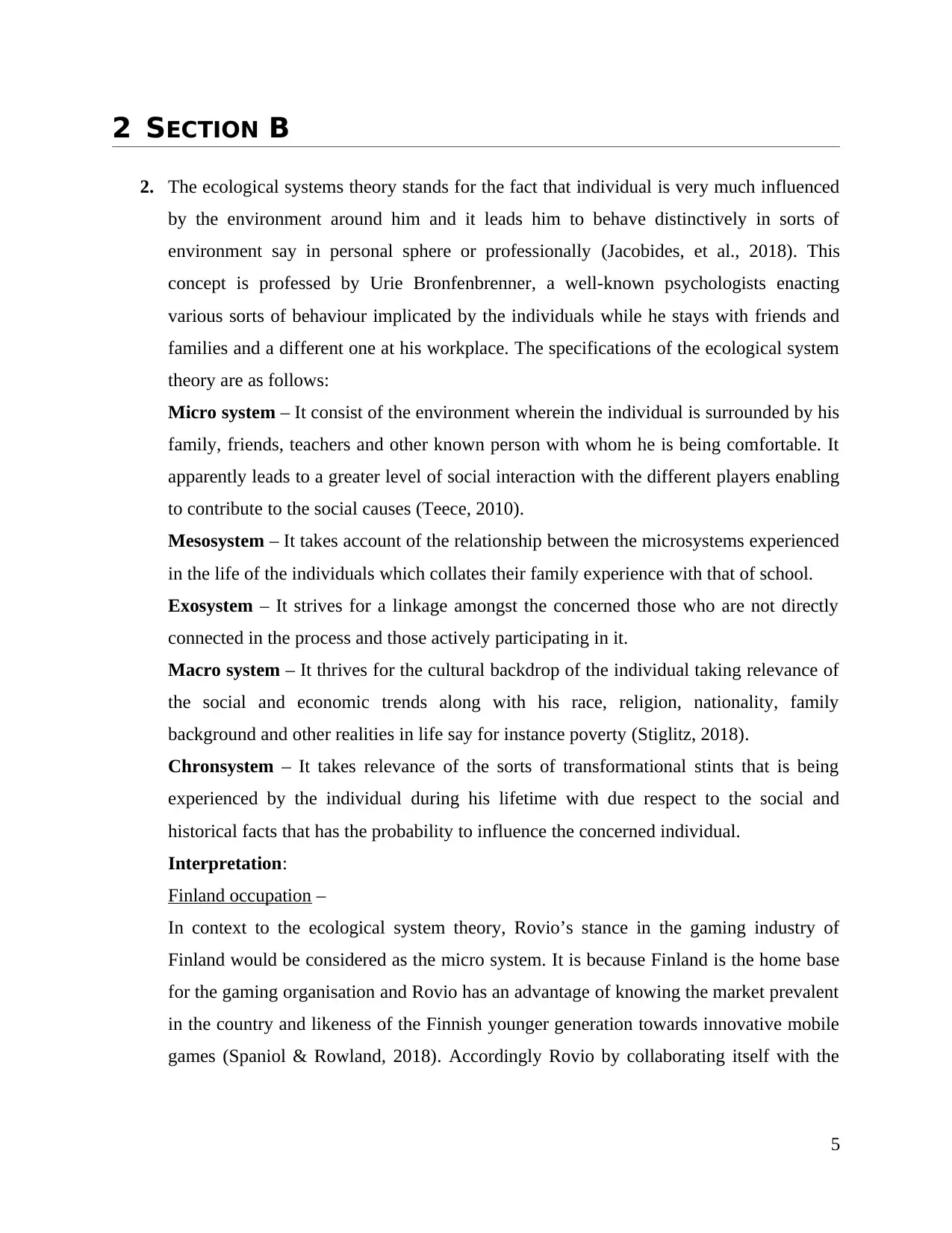
2 SECTION B
2. The ecological systems theory stands for the fact that individual is very much influenced
by the environment around him and it leads him to behave distinctively in sorts of
environment say in personal sphere or professionally (Jacobides, et al., 2018). This
concept is professed by Urie Bronfenbrenner, a well-known psychologists enacting
various sorts of behaviour implicated by the individuals while he stays with friends and
families and a different one at his workplace. The specifications of the ecological system
theory are as follows:
Micro system – It consist of the environment wherein the individual is surrounded by his
family, friends, teachers and other known person with whom he is being comfortable. It
apparently leads to a greater level of social interaction with the different players enabling
to contribute to the social causes (Teece, 2010).
Mesosystem – It takes account of the relationship between the microsystems experienced
in the life of the individuals which collates their family experience with that of school.
Exosystem – It strives for a linkage amongst the concerned those who are not directly
connected in the process and those actively participating in it.
Macro system – It thrives for the cultural backdrop of the individual taking relevance of
the social and economic trends along with his race, religion, nationality, family
background and other realities in life say for instance poverty (Stiglitz, 2018).
Chronsystem – It takes relevance of the sorts of transformational stints that is being
experienced by the individual during his lifetime with due respect to the social and
historical facts that has the probability to influence the concerned individual.
Interpretation:
Finland occupation –
In context to the ecological system theory, Rovio’s stance in the gaming industry of
Finland would be considered as the micro system. It is because Finland is the home base
for the gaming organisation and Rovio has an advantage of knowing the market prevalent
in the country and likeness of the Finnish younger generation towards innovative mobile
games (Spaniol & Rowland, 2018). Accordingly Rovio by collaborating itself with the
5
2. The ecological systems theory stands for the fact that individual is very much influenced
by the environment around him and it leads him to behave distinctively in sorts of
environment say in personal sphere or professionally (Jacobides, et al., 2018). This
concept is professed by Urie Bronfenbrenner, a well-known psychologists enacting
various sorts of behaviour implicated by the individuals while he stays with friends and
families and a different one at his workplace. The specifications of the ecological system
theory are as follows:
Micro system – It consist of the environment wherein the individual is surrounded by his
family, friends, teachers and other known person with whom he is being comfortable. It
apparently leads to a greater level of social interaction with the different players enabling
to contribute to the social causes (Teece, 2010).
Mesosystem – It takes account of the relationship between the microsystems experienced
in the life of the individuals which collates their family experience with that of school.
Exosystem – It strives for a linkage amongst the concerned those who are not directly
connected in the process and those actively participating in it.
Macro system – It thrives for the cultural backdrop of the individual taking relevance of
the social and economic trends along with his race, religion, nationality, family
background and other realities in life say for instance poverty (Stiglitz, 2018).
Chronsystem – It takes relevance of the sorts of transformational stints that is being
experienced by the individual during his lifetime with due respect to the social and
historical facts that has the probability to influence the concerned individual.
Interpretation:
Finland occupation –
In context to the ecological system theory, Rovio’s stance in the gaming industry of
Finland would be considered as the micro system. It is because Finland is the home base
for the gaming organisation and Rovio has an advantage of knowing the market prevalent
in the country and likeness of the Finnish younger generation towards innovative mobile
games (Spaniol & Rowland, 2018). Accordingly Rovio by collaborating itself with the
5
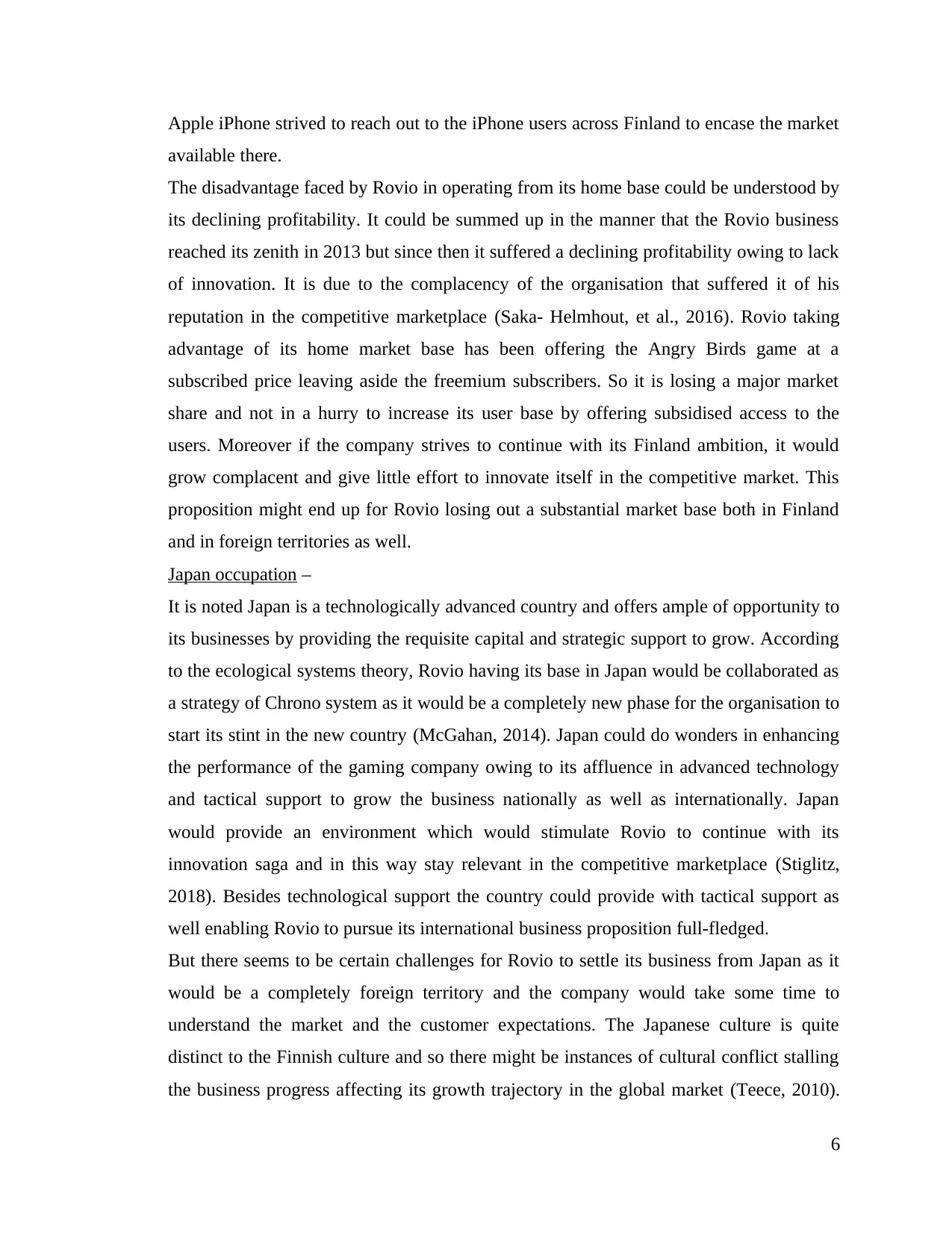
Apple iPhone strived to reach out to the iPhone users across Finland to encase the market
available there.
The disadvantage faced by Rovio in operating from its home base could be understood by
its declining profitability. It could be summed up in the manner that the Rovio business
reached its zenith in 2013 but since then it suffered a declining profitability owing to lack
of innovation. It is due to the complacency of the organisation that suffered it of his
reputation in the competitive marketplace (Saka- Helmhout, et al., 2016). Rovio taking
advantage of its home market base has been offering the Angry Birds game at a
subscribed price leaving aside the freemium subscribers. So it is losing a major market
share and not in a hurry to increase its user base by offering subsidised access to the
users. Moreover if the company strives to continue with its Finland ambition, it would
grow complacent and give little effort to innovate itself in the competitive market. This
proposition might end up for Rovio losing out a substantial market base both in Finland
and in foreign territories as well.
Japan occupation –
It is noted Japan is a technologically advanced country and offers ample of opportunity to
its businesses by providing the requisite capital and strategic support to grow. According
to the ecological systems theory, Rovio having its base in Japan would be collaborated as
a strategy of Chrono system as it would be a completely new phase for the organisation to
start its stint in the new country (McGahan, 2014). Japan could do wonders in enhancing
the performance of the gaming company owing to its affluence in advanced technology
and tactical support to grow the business nationally as well as internationally. Japan
would provide an environment which would stimulate Rovio to continue with its
innovation saga and in this way stay relevant in the competitive marketplace (Stiglitz,
2018). Besides technological support the country could provide with tactical support as
well enabling Rovio to pursue its international business proposition full-fledged.
But there seems to be certain challenges for Rovio to settle its business from Japan as it
would be a completely foreign territory and the company would take some time to
understand the market and the customer expectations. The Japanese culture is quite
distinct to the Finnish culture and so there might be instances of cultural conflict stalling
the business progress affecting its growth trajectory in the global market (Teece, 2010).
6
available there.
The disadvantage faced by Rovio in operating from its home base could be understood by
its declining profitability. It could be summed up in the manner that the Rovio business
reached its zenith in 2013 but since then it suffered a declining profitability owing to lack
of innovation. It is due to the complacency of the organisation that suffered it of his
reputation in the competitive marketplace (Saka- Helmhout, et al., 2016). Rovio taking
advantage of its home market base has been offering the Angry Birds game at a
subscribed price leaving aside the freemium subscribers. So it is losing a major market
share and not in a hurry to increase its user base by offering subsidised access to the
users. Moreover if the company strives to continue with its Finland ambition, it would
grow complacent and give little effort to innovate itself in the competitive market. This
proposition might end up for Rovio losing out a substantial market base both in Finland
and in foreign territories as well.
Japan occupation –
It is noted Japan is a technologically advanced country and offers ample of opportunity to
its businesses by providing the requisite capital and strategic support to grow. According
to the ecological systems theory, Rovio having its base in Japan would be collaborated as
a strategy of Chrono system as it would be a completely new phase for the organisation to
start its stint in the new country (McGahan, 2014). Japan could do wonders in enhancing
the performance of the gaming company owing to its affluence in advanced technology
and tactical support to grow the business nationally as well as internationally. Japan
would provide an environment which would stimulate Rovio to continue with its
innovation saga and in this way stay relevant in the competitive marketplace (Stiglitz,
2018). Besides technological support the country could provide with tactical support as
well enabling Rovio to pursue its international business proposition full-fledged.
But there seems to be certain challenges for Rovio to settle its business from Japan as it
would be a completely foreign territory and the company would take some time to
understand the market and the customer expectations. The Japanese culture is quite
distinct to the Finnish culture and so there might be instances of cultural conflict stalling
the business progress affecting its growth trajectory in the global market (Teece, 2010).
6
⊘ This is a preview!⊘
Do you want full access?
Subscribe today to unlock all pages.

Trusted by 1+ million students worldwide
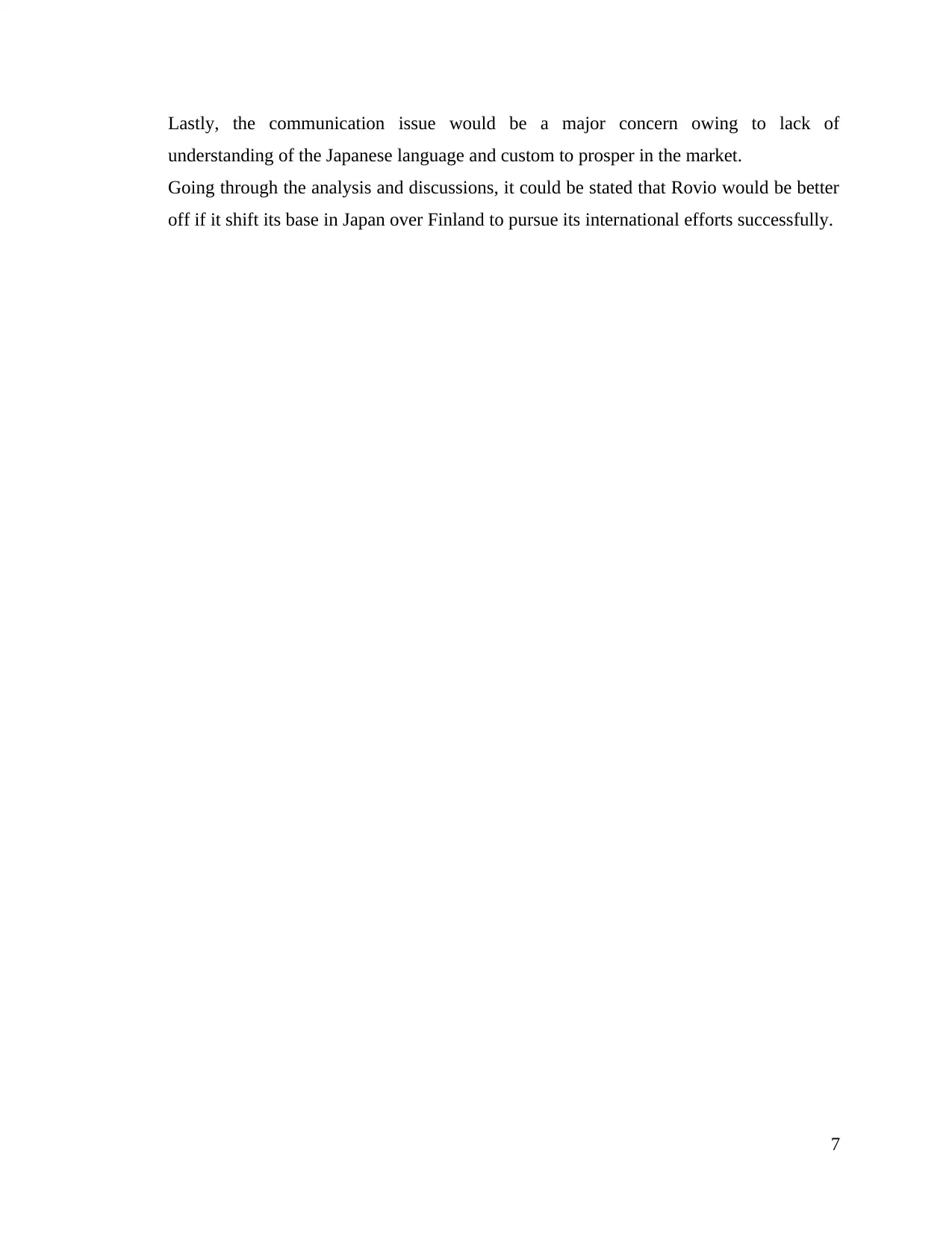
Lastly, the communication issue would be a major concern owing to lack of
understanding of the Japanese language and custom to prosper in the market.
Going through the analysis and discussions, it could be stated that Rovio would be better
off if it shift its base in Japan over Finland to pursue its international efforts successfully.
7
understanding of the Japanese language and custom to prosper in the market.
Going through the analysis and discussions, it could be stated that Rovio would be better
off if it shift its base in Japan over Finland to pursue its international efforts successfully.
7
Paraphrase This Document
Need a fresh take? Get an instant paraphrase of this document with our AI Paraphraser
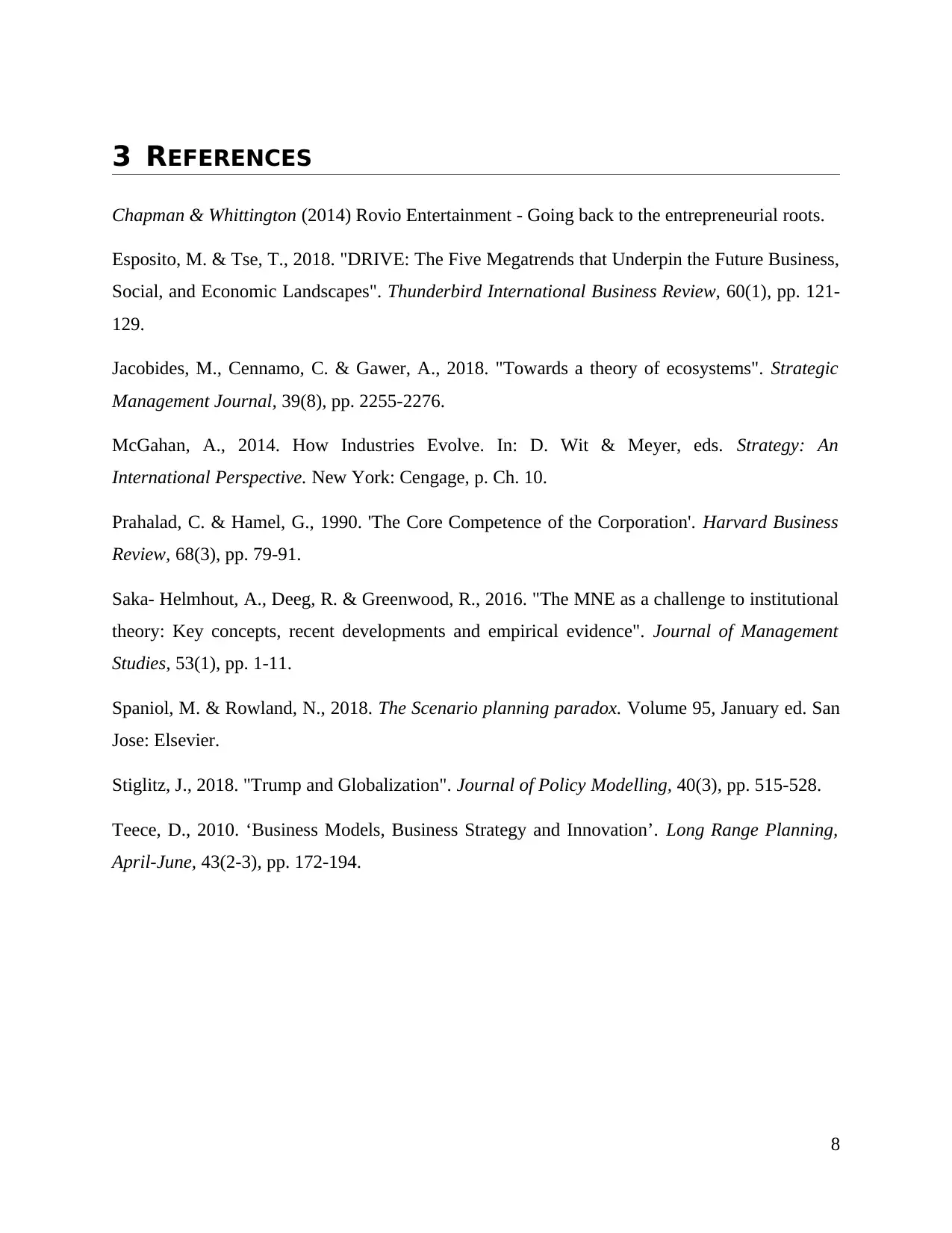
3 REFERENCES
Chapman & Whittington (2014) Rovio Entertainment - Going back to the entrepreneurial roots.
Esposito, M. & Tse, T., 2018. "DRIVE: The Five Megatrends that Underpin the Future Business,
Social, and Economic Landscapes". Thunderbird International Business Review, 60(1), pp. 121-
129.
Jacobides, M., Cennamo, C. & Gawer, A., 2018. "Towards a theory of ecosystems". Strategic
Management Journal, 39(8), pp. 2255-2276.
McGahan, A., 2014. How Industries Evolve. In: D. Wit & Meyer, eds. Strategy: An
International Perspective. New York: Cengage, p. Ch. 10.
Prahalad, C. & Hamel, G., 1990. 'The Core Competence of the Corporation'. Harvard Business
Review, 68(3), pp. 79-91.
Saka- Helmhout, A., Deeg, R. & Greenwood, R., 2016. "The MNE as a challenge to institutional
theory: Key concepts, recent developments and empirical evidence". Journal of Management
Studies, 53(1), pp. 1-11.
Spaniol, M. & Rowland, N., 2018. The Scenario planning paradox. Volume 95, January ed. San
Jose: Elsevier.
Stiglitz, J., 2018. "Trump and Globalization". Journal of Policy Modelling, 40(3), pp. 515-528.
Teece, D., 2010. ‘Business Models, Business Strategy and Innovation’. Long Range Planning,
April-June, 43(2-3), pp. 172-194.
8
Chapman & Whittington (2014) Rovio Entertainment - Going back to the entrepreneurial roots.
Esposito, M. & Tse, T., 2018. "DRIVE: The Five Megatrends that Underpin the Future Business,
Social, and Economic Landscapes". Thunderbird International Business Review, 60(1), pp. 121-
129.
Jacobides, M., Cennamo, C. & Gawer, A., 2018. "Towards a theory of ecosystems". Strategic
Management Journal, 39(8), pp. 2255-2276.
McGahan, A., 2014. How Industries Evolve. In: D. Wit & Meyer, eds. Strategy: An
International Perspective. New York: Cengage, p. Ch. 10.
Prahalad, C. & Hamel, G., 1990. 'The Core Competence of the Corporation'. Harvard Business
Review, 68(3), pp. 79-91.
Saka- Helmhout, A., Deeg, R. & Greenwood, R., 2016. "The MNE as a challenge to institutional
theory: Key concepts, recent developments and empirical evidence". Journal of Management
Studies, 53(1), pp. 1-11.
Spaniol, M. & Rowland, N., 2018. The Scenario planning paradox. Volume 95, January ed. San
Jose: Elsevier.
Stiglitz, J., 2018. "Trump and Globalization". Journal of Policy Modelling, 40(3), pp. 515-528.
Teece, D., 2010. ‘Business Models, Business Strategy and Innovation’. Long Range Planning,
April-June, 43(2-3), pp. 172-194.
8
1 out of 8
Your All-in-One AI-Powered Toolkit for Academic Success.
+13062052269
info@desklib.com
Available 24*7 on WhatsApp / Email
![[object Object]](/_next/static/media/star-bottom.7253800d.svg)
Unlock your academic potential
Copyright © 2020–2026 A2Z Services. All Rights Reserved. Developed and managed by ZUCOL.


